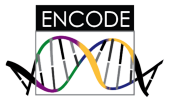The ENCODE Experiment Matrix is a set of web pages that visually summarize the types of data produced by the ENCODE project during the first production phase (September 2007 to July 2012). For ENCODE data generated after 2012, see the ENCODE Portal, encodeproject.org.
The data summarized here is all hosted at UCSC as browser tracks and downloadable files. The grid on the main Experiment Matrix page shows the number of experiments for each cell type/assay pairing. The ChIP-seq Experiment Matrix page provides a more detailed view of the chromatin immunoprecipitation experiment subset, showing experiments by cell type and antibody target. Cell types annotated as normal vs. cancer are marked with a colored dot. The companion Experiment Summary page lists the number of experiments by assay type alone and may include annotations that are cell-type independent (annotations on the reference genome).
An ENCODE experiment is defined as a biochemical assay and follow-on data analyses performed on a single cell type by a single lab. Data from an experiment is typically displayed in multiple browser tracks that offer different views of the data (e.g. enrichment signal graph, peak calls) and is available for download in multiple file formats (e.g. sequence alignments in BAM format, signal graph in bigWig format) that support different analysis methods. Data for multiple replicates are included in a single experiment.
To display or download ENCODE data, select either the tracks or files option
in the
![]() panel, then click the appropriate box in the matrix grid (or row in the summary tables).
This will display a search window (via the UCSC Track Search or File Search
tool) that lists the full set of browser tracks or downloadable files for the selected experiments.
This window also provides options to configure the browser view or refine the list of
downloadable files.
panel, then click the appropriate box in the matrix grid (or row in the summary tables).
This will display a search window (via the UCSC Track Search or File Search
tool) that lists the full set of browser tracks or downloadable files for the selected experiments.
This window also provides options to configure the browser view or refine the list of
downloadable files.
These pages are best viewed in Firefox, Chrome, or Safari browsers.
×